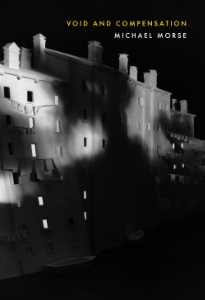Michael Morse
Michael Morse's Void and Compensation (Canarium Books, 2015) was a finalist for the 2016 Kate Tufts Discovery Award.
Michael Morse was born in New York City and raised in Roslyn, New York. The recipient of fellowships from the Fine Arts Work Center in Provincetown, the MacDowell Colony, and Yaddo, he has published poems in various journals. He lives in Brooklyn, New York, and teaches English at the Ethical Culture Fieldston School.
"In this debut from a grownup poet, heartfelt scenes are filmed by a jittery cameraman, making for a moving read that will appeal to those who don’t take their poetry quite straight, who want to be led, like 'wayward bees to open windows.'" — Craig Morgan Teicher for NPR.org
"There is a keen and seamless craftsmanship in Michael Morse’s poems, which are beautifully understated and distinctly well made. They are quiet, but they have dark undertows, and I find some of them heartbreaking. There is real quality and depth in the poetry of this gifted and caring poet." — Edward Hirsch
"Morse’s astonishing centerpiece poem—'(Poem as Aporia Between Lighthouses)'— establishes him as a worthy successor to, among others, Wallace Stevens: throughout this book Morse offers what Stevens called “the poem of the mind in the act of finding/what will suffice” — as in the “Colorless bay waves/that adopt blue light and its orphaned molecules.”— Maureen McLane
"When you come face to face with genius, you feel it with that pleasurable shock of recognition in something perfectly achieved and wildly imagined. Verbal genius, the genius of impersonal feeling, the genius of feeling that can’t help but be personal, the genius of a music that combines all the best of Berryman and Hopkins, Stevens and Williams, these are the qualities that make Void and Compensation one of the most original and pleasurable books that I’ve read in many years." — Tom Sleigh
"Reading Michael Morse’s Void and Compensation is like being on intravenous bliss and longing, in the presence of pure song. The tenderness of a man’s trials—trial as in inquiry, experiment, ordeal, worry—rigmaroles with sheer musical bravura in these poems that turn metaphor and word play into a new 'weather of fevered unthinking.' Ambivalence is the keynote here, passionate ambivalence (conveyed through an equally passionate syntax). I love the indecision that allows the deepest human truths (doubt, desire, hope, regret) to draw a 'promiscuity of maps.' The speaker in these poems is equal parts lost and found, beautifully so." — Catherine Barnett


